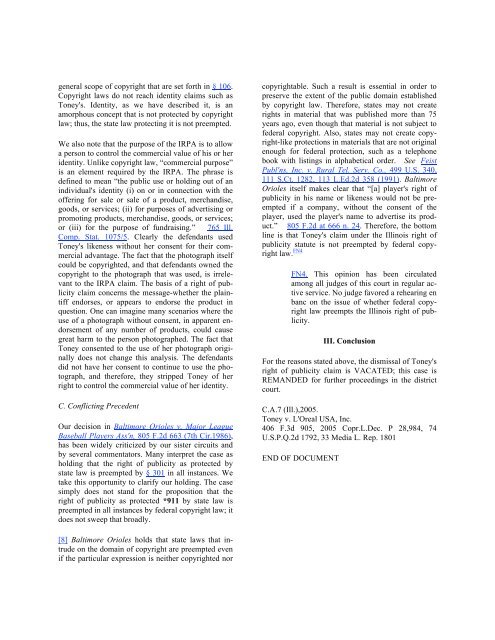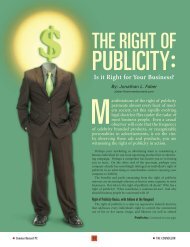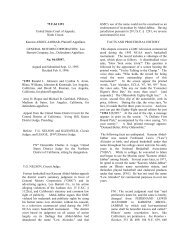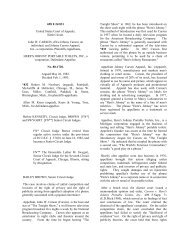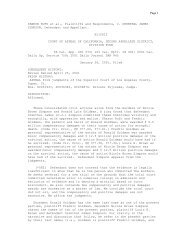Toney v. L'Oreal - Right Of Publicity
Toney v. L'Oreal - Right Of Publicity
Toney v. L'Oreal - Right Of Publicity
Create successful ePaper yourself
Turn your PDF publications into a flip-book with our unique Google optimized e-Paper software.
general scope of copyright that are set forth in § 106.<br />
Copyright laws do not reach identity claims such as<br />
<strong>Toney</strong>'s. Identity, as we have described it, is an<br />
amorphous concept that is not protected by copyright<br />
law; thus, the state law protecting it is not preempted.<br />
We also note that the purpose of the IRPA is to allow<br />
a person to control the commercial value of his or her<br />
identity. Unlike copyright law, “commercial purpose”<br />
is an element required by the IRPA. The phrase is<br />
defined to mean “the public use or holding out of an<br />
individual's identity (i) on or in connection with the<br />
offering for sale or sale of a product, merchandise,<br />
goods, or services; (ii) for purposes of advertising or<br />
promoting products, merchandise, goods, or services;<br />
or (iii) for the purpose of fundraising.” 765 Ill.<br />
Comp. Stat. 1075/5. Clearly the defendants used<br />
<strong>Toney</strong>'s likeness without her consent for their commercial<br />
advantage. The fact that the photograph itself<br />
could be copyrighted, and that defendants owned the<br />
copyright to the photograph that was used, is irrelevant<br />
to the IRPA claim. The basis of a right of publicity<br />
claim concerns the message-whether the plaintiff<br />
endorses, or appears to endorse the product in<br />
question. One can imagine many scenarios where the<br />
use of a photograph without consent, in apparent endorsement<br />
of any number of products, could cause<br />
great harm to the person photographed. The fact that<br />
<strong>Toney</strong> consented to the use of her photograph originally<br />
does not change this analysis. The defendants<br />
did not have her consent to continue to use the photograph,<br />
and therefore, they stripped <strong>Toney</strong> of her<br />
right to control the commercial value of her identity.<br />
C. Conflicting Precedent<br />
Our decision in Baltimore Orioles v. Major League<br />
Baseball Players Ass'n, 805 F.2d 663 (7th Cir.1986),<br />
has been widely criticized by our sister circuits and<br />
by several commentators. Many interpret the case as<br />
holding that the right of publicity as protected by<br />
state law is preempted by § 301 in all instances. We<br />
take this opportunity to clarify our holding. The case<br />
simply does not stand for the proposition that the<br />
right of publicity as protected *911 by state law is<br />
preempted in all instances by federal copyright law; it<br />
does not sweep that broadly.<br />
copyrightable. Such a result is essential in order to<br />
preserve the extent of the public domain established<br />
by copyright law. Therefore, states may not create<br />
rights in material that was published more than 75<br />
years ago, even though that material is not subject to<br />
federal copyright. Also, states may not create copyright-like<br />
protections in materials that are not original<br />
enough for federal protection, such as a telephone<br />
book with listings in alphabetical order. See Feist<br />
Publ'ns, Inc. v. Rural Tel. Serv. Co., 499 U.S. 340,<br />
111 S.Ct. 1282, 113 L.Ed.2d 358 (1991). Baltimore<br />
Orioles itself makes clear that “[a] player's right of<br />
publicity in his name or likeness would not be preempted<br />
if a company, without the consent of the<br />
player, used the player's name to advertise its product.”<br />
805 F.2d at 666 n. 24. Therefore, the bottom<br />
line is that <strong>Toney</strong>'s claim under the Illinois right of<br />
publicity statute is not preempted by federal copyright<br />
law. FN4<br />
FN4. This opinion has been circulated<br />
among all judges of this court in regular active<br />
service. No judge favored a rehearing en<br />
banc on the issue of whether federal copyright<br />
law preempts the Illinois right of publicity.<br />
III. Conclusion<br />
For the reasons stated above, the dismissal of <strong>Toney</strong>'s<br />
right of publicity claim is VACATED; this case is<br />
REMANDED for further proceedings in the district<br />
court.<br />
C.A.7 (Ill.),2005.<br />
<strong>Toney</strong> v. <strong>L'Oreal</strong> USA, Inc.<br />
406 F.3d 905, 2005 Copr.L.Dec. P 28,984, 74<br />
U.S.P.Q.2d 1792, 33 Media L. Rep. 1801<br />
END OF DOCUMENT<br />
[8] Baltimore Orioles holds that state laws that intrude<br />
on the domain of copyright are preempted even<br />
if the particular expression is neither copyrighted nor


